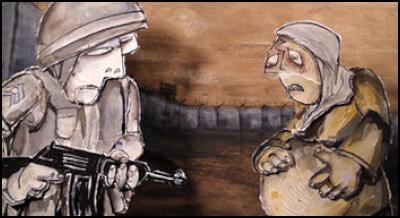Sonia Nettnin Film Review: God On Our Side
Film Review: God On Our Side
By Sonia Nettnin

A woman in labor leaves
the checkpoint line. She needs help. The soldier forces her
back with his gun. If you look closely at their faces,
notice the human profile in-between their eyes (Photo
courtesy of CPFF).
The animation film, “God On Our Side,” illustrates the effects of military occupation and violence on humanity.
The characters look like sculptured, people figures in some of Pablo Picasso’s work post-World War I. This film’s origins began with Picasso’s “Guernica” (1937). I reached this conclusion because I thought I saw “Guernica” at the Picasso Museum in Paris. However, I found an image of it online. The brown and gray hues in the film match Picasso’s painting. The animals created are similar and the use of enlarged skulls, disarranged eyes and barbed wire is prominent in the film. The painting shows people in chaos and this animation film portrays the same shock and trauma created by war. Peoples’ reconfigured eyes represent a skewed outlook on the future.
Through artistic medium, the Lost Generation expressed these emotions, and this film team uses animation as a vehicle for present-day events.
The string music set the mood for this piece. The violins and cellos played below the bridge, which creates a grating, squeaking sound. The traditional music on Oud helps orient the viewer to the Middle East, where demonstrators chant “AlNakba, Catastrophe.”
The recurring motif of the fetus causes the film’s climax when an Israeli soldier at the checkpoint forces a pregnant, Muslim woman in labor to have her baby without assistance on the ground. It has a mild resemblance to Picasso’s “Mother and Son,” (1938), except Picasso depicts the joy of new life in shades of purple. The film portrays the fate of a checkpoint baby.
The violence of occupation results in a devastated mother who cradles her dead newborn. Living through her tragedy, the mother rocks her infant’s lifeless body to her mournful lullaby.
This film team should continue with a series of animation films because the work they created is extraordinary.
***
Directed, animated and written by: Michal Pfeffer
and Uri Kranat
Produce by: Netherland Institute for
Animation Film; Tom Crone; Caspar de Kiefte
Co-produced
by: Radio Netherlands Television; Aad Van Ierland
Country
of Production: The Netherlands
Year: 2005
Minutes:
7
Production Company: Tin Drum Animation
Music: Uri
Kranot
Arrangers and Performers: Daniel Kiczaleo; Crez
Nataf; Alan Nataf; Sherry Weinstein; Grisha Gelea; Yael
Tai
Technical Support: Peter van de Zanden
Sound: Noan
Yalah
Sound effects and mastering: Bob Kommer Sound
Studio; Ronald and Jeroan Nadoip
Film transfer and print:
Cineco
Sonia Nettnin is a freelance writer. Her articles and reviews demonstrate civic journalism, with a focus on international social, economic, humanitarian, gender, and political issues. Media coverage of conflicts from these perspectives develops awareness in public opinion.
Nettnin received her bachelor's degree in English literature and writing. She did master's work in journalism. Moreover, Nettnin approaches her writing from a working woman's perspective, since working began for her at an early age.
She is a poet, a violinist and she studied professional dance. As a writer, the arts are an integral part of her sensibility. Her work has been published in the Palestine Chronicle, Scoop Media and the Washington Report on Middle East Affairs. She lives in Chicago.
\


 Binoy Kampmark: The Selling Of America - Ending The US Dollar’s Exorbitant Privilege
Binoy Kampmark: The Selling Of America - Ending The US Dollar’s Exorbitant Privilege Frances Palmer: Remembering Vietnam And Cambodia 50 Years On During ANZAC Week
Frances Palmer: Remembering Vietnam And Cambodia 50 Years On During ANZAC Week Binoy Kampmark: Euphemistic Practices - The IDF, Killing Aid Workers And Self-Investigation
Binoy Kampmark: Euphemistic Practices - The IDF, Killing Aid Workers And Self-Investigation Gordon Campbell: On The Left’s Electability Crisis, And The Abundance Ecotopia
Gordon Campbell: On The Left’s Electability Crisis, And The Abundance Ecotopia Ramzy Baroud: French Contradictions | Macron's Palestine Play - Too Little, Too Late?
Ramzy Baroud: French Contradictions | Macron's Palestine Play - Too Little, Too Late? Martin LeFevre - Meditations: Easter Reflections
Martin LeFevre - Meditations: Easter Reflections